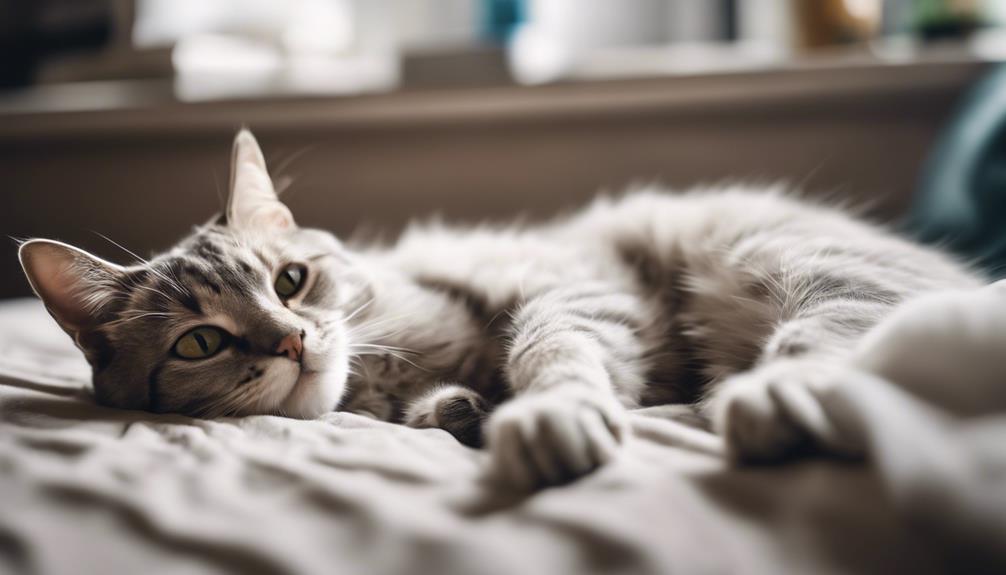As feline companions enrich our lives, their well-being is a priority for responsible pet owners.
Allergies in cats can manifest in various forms, impacting their health and comfort. Recognizing the subtle signs of allergic reactions in felines is crucial for early intervention and appropriate care.
From skin irritations to gastrointestinal disturbances, allergies can present challenges for both cats and their human caregivers. Understanding how to spot, treat, and prevent these allergies is essential for ensuring the optimal health and happiness of our beloved furry friends.
Key Takeaways
- Recognize signs of allergies in cats promptly for proper care.
- Implement preventive measures like flea treatments and environmental changes.
- Seek veterinary advice for accurate allergy testing and diagnosis.
- Consider treatments such as antihistamines and immunotherapy for relief and desensitization.
Common Signs of Cat Allergies
When observing a cat for potential allergies, recognizing common signs is crucial for prompt identification and appropriate care. Common signs of allergies in cats include excessive scratching, licking, or biting at their skin, leading to redness or hair loss. Cats may also exhibit sneezing, coughing, watery eyes, or nasal discharge.
Skin issues like rashes, bumps, or scabbing can indicate allergic reactions. Gastrointestinal problems such as vomiting or diarrhea may also signal allergies in cats. Observing changes in behavior, like increased lethargy or irritability, can be key indicators of underlying allergies.
Effective Treatment Options for Cats
To effectively manage cat allergies, a combination of preventative measures and targeted treatments tailored to the specific allergens is key in providing relief and improving the quality of life for affected felines. Here are some effective treatment options for cats:
- Medication: Veterinarians may prescribe antihistamines or corticosteroids to alleviate symptoms.
- Immunotherapy: Allergy shots can help desensitize cats to specific allergens over time.
- Topical Treatments: Shampoos, sprays, or creams can provide relief for skin-related allergies.
- Dietary Management: Switching to hypoallergenic diets can help identify and eliminate food-related allergies.
Practical Prevention Strategies for Allergies

In addressing the management of cat allergies, implementing practical prevention strategies is paramount to minimizing allergen exposure and enhancing the well-being of feline companions.
To prevent allergies in cats, consider making your home a hypoallergenic haven by regularly cleaning and dusting to reduce environmental allergens. Opt for low-dust, unscented litter and pet-safe cleaning products to minimize allergic reactions. Grooming your cat after outdoor adventures can help remove potential allergens like pollen.
Additionally, using air purifiers and vacuuming frequently can further reduce allergens in your cat's environment. By taking these proactive steps, you can create a healthier and more comfortable living space for your beloved feline friend.
Understanding Allergy Testing in Cats
Understanding the process of allergy testing in cats is essential for accurately diagnosing and managing feline allergies. When it comes to testing for allergies in cats, several methods can be utilized:
- Blood Testing: This non-invasive approach helps detect allergies, although results may take some time to come back.
- Intradermal Skin Testing: A reliable method that involves allergen injections after sedation, providing detailed information on specific allergies.
- Flea Allergy Testing: This entails checking for fleas and recommending appropriate preventive measures to manage flea allergies.
- Food Allergy Diagnosis: Elimination diets are commonly used to identify food allergies in cats since there isn't a direct test available.
Seeking guidance from a veterinarian is crucial for accurate allergy testing and diagnosis.
Importance of Veterinary Consultation for Allergies

Seeking professional veterinary consultation is paramount for effectively managing and treating allergies in cats. Veterinarians play a crucial role in diagnosing the specific allergens affecting your feline friend and devising a tailored treatment plan. Allergies in cats can manifest in various ways, from skin issues to respiratory problems, making accurate diagnosis essential.
Veterinary consultations ensure that the correct tests are conducted, such as blood or skin testing, to pinpoint the allergens triggering your cat's reactions. Moreover, vets can recommend suitable medications, like antihistamines, or even immunotherapy for long-term relief. By partnering with a veterinarian, you can provide the best care for your cat's allergies and improve their quality of life.
Managing Environmental Allergens at Home
Effective management of environmental allergens at home is crucial in providing a comfortable and safe environment for cats with allergies. To create a sanctuary for your feline friend, consider the following tips:
- Regular Cleaning: Keep your home clean by vacuuming carpets, rugs, and furniture to reduce allergen buildup.
- Air Quality Control: Use air purifiers to filter out airborne allergens and improve indoor air quality.
- Allergen-Free Zone: Designate a specific area in your home where your cat can retreat to minimize exposure to allergens.
- Grooming Practices: Regularly groom your cat to remove potential allergens from their fur and skin, helping to alleviate allergy symptoms and discomfort.
Conclusion
In conclusion, allergies in cats can manifest in various ways, from respiratory issues to skin problems. According to a study by the American Association of Feline Practitioners, approximately 1 in 5 cats suffer from some form of allergy.
Understanding the signs, treatment options, prevention strategies, and the importance of veterinary consultation is essential in ensuring the well-being of our feline companions.
By taking proactive steps to manage allergies, cat owners can help their pets lead healthier and happier lives.veterinary consultation is essential in ensuring the well-being of our feline companions.ir health and comfort. Recognizing the subtle signs of allergic reactions in felines is crucial for early intervention and appropriate care.
From skin irritations to gastrointestinal disturbances, allergies can present challenges for both cats and their human caregivers. Understanding how to spot, treat, and prevent these allergies is essential for ensuring the optimal health and happiness of our beloved furry friends.
Key Takeaways
- Recognize signs of allergies in cats promptly for proper care.
- Implement preventive measures like flea treatments and environmental changes.
- Seek veterinary advice for accurate allergy testing and diagnosis.
- Consider treatments such as antihistamines and immunotherapy for relief and desensitization.
Common Signs of Cat Allergies
When observing a cat for potential allergies, recognizing common signs is crucial for prompt identification and appropriate care. Common signs of allergies in cats include excessive scratching, licking, or biting at their skin, leading to redness or hair loss. Cats may also exhibit sneezing, coughing, watery eyes, or nasal discharge.
Skin issues like rashes, bumps, or scabbing can indicate allergic reactions. Gastrointestinal problems such as vomiting or diarrhea may also signal allergies in cats. Observing changes in behavior, like increased lethargy or irritability, can be key indicators of underlying allergies.
Effective Treatment Options for Cats
To effectively manage cat allergies, a combination of preventative measures and targeted treatments tailored to the specific allergens is key in providing relief and improving the quality of life for affected felines. Here are some effective treatment options for cats:
- Medication: Veterinarians may prescribe antihistamines or corticosteroids to alleviate symptoms.
- Immunotherapy: Allergy shots can help desensitize cats to specific allergens over time.
- Topical Treatments: Shampoos, sprays, or creams can provide relief for skin-related allergies.
- Dietary Management: Switching to hypoallergenic diets can help identify and eliminate food-related allergies.
Practical Prevention Strategies for Allergies

In addressing the management of cat allergies, implementing practical prevention strategies is paramount to minimizing allergen exposure and enhancing the well-being of feline companions.
To prevent allergies in cats, consider making your home a hypoallergenic haven by regularly cleaning and dusting to reduce environmental allergens. Opt for low-dust, unscented litter and pet-safe cleaning products to minimize allergic reactions. Grooming your cat after outdoor adventures can help remove potential allergens like pollen.
Additionally, using air purifiers and vacuuming frequently can further reduce allergens in your cat's environment. By taking these proactive steps, you can create a healthier and more comfortable living space for your beloved feline friend.
Understanding Allergy Testing in Cats
Understanding the process of allergy testing in cats is essential for accurately diagnosing and managing feline allergies. When it comes to testing for allergies in cats, several methods can be utilized:
- Blood Testing: This non-invasive approach helps detect allergies, although results may take some time to come back.
- Intradermal Skin Testing: A reliable method that involves allergen injections after sedation, providing detailed information on specific allergies.
- Flea Allergy Testing: This entails checking for fleas and recommending appropriate preventive measures to manage flea allergies.
- Food Allergy Diagnosis: Elimination diets are commonly used to identify food allergies in cats since there isn't a direct test available.
Seeking guidance from a veterinarian is crucial for accurate allergy testing and diagnosis.
Importance of Veterinary Consultation for Allergies

Seeking professional veterinary consultation is paramount for effectively managing and treating allergies in cats. Veterinarians play a crucial role in diagnosing the specific allergens affecting your feline friend and devising a tailored treatment plan. Allergies in cats can manifest in various ways, from skin issues to respiratory problems, making accurate diagnosis essential.
Veterinary consultations ensure that the correct tests are conducted, such as blood or skin testing, to pinpoint the allergens triggering your cat's reactions. Moreover, vets can recommend suitable medications, like antihistamines, or even immunotherapy for long-term relief. By partnering with a veterinarian, you can provide the best care for your cat's allergies and improve their quality of life.
Managing Environmental Allergens at Home
Effective management of environmental allergens at home is crucial in providing a comfortable and safe environment for cats with allergies. To create a sanctuary for your feline friend, consider the following tips:
- Regular Cleaning: Keep your home clean by vacuuming carpets, rugs, and furniture to reduce allergen buildup.
- Air Quality Control: Use air purifiers to filter out airborne allergens and improve indoor air quality.
- Allergen-Free Zone: Designate a specific area in your home where your cat can retreat to minimize exposure to allergens.
- Grooming Practices: Regularly groom your cat to remove potential allergens from their fur and skin, helping to alleviate allergy symptoms and discomfort.
Conclusion
In conclusion, allergies in cats can manifest in various ways, from respiratory issues to skin problems. According to a study by the American Association of Feline Practitioners, approximately 1 in 5 cats suffer from some form of allergy.
Understanding the signs, treatment options, prevention strategies, and the importance of veterinary consultation is essential in ensuring the well-being of our feline companions.
By taking proactive steps to manage allergies, cat owners can help their pets lead healthier and happier lives.




